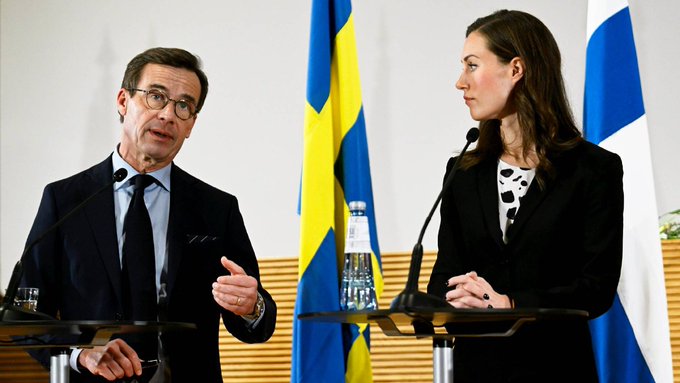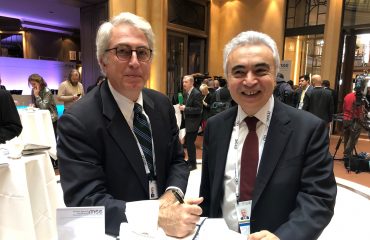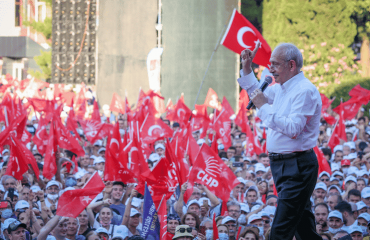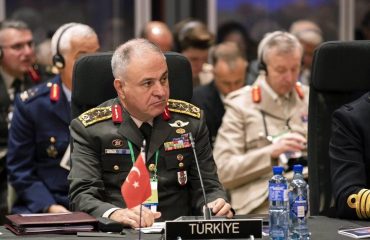

Will the promises be enough? Prime Minister of Sweden Kristersson (left), at a joint press conference with Finnish Prime Minister Marin, awaiting President Erdoğan’s decision on their countries’ NATO membership bid. (Photo: Twitter/Kristersson)
Finland seems to have already been convinced to do whatever Türkiye wants for granting NATO membership; from the extradition of outlawed PKK members to arms industry support. The question is whether Sweden’s new Prime Minister, Ulf Kristersson, will be able to convince President Tayyip Erdogan to let them join NATO.
After meeting with NATO Secretary General Jens Stoltenberg last week, Foreign Minister Mevlüt Çavuşoğlu said that “there is no serious problem with Finland,” adding that the process is progressing slowly “due to the two countries’ request for membership applications to be issued together.”
The misfortune of Finnish Prime Minister Sanna Marin is that her country’s destiny to join NATO is joined with Sweden.
The previous Swedish minority government needed the vote of confidence of Kurdish MP Aminah Kakabaveh, who is known to be a PKK sympathizer. Kristersson at least has no such handicap. He also emphasises this, saying that they cannot have relations with the PKK, including the Syrian YPG to his promise.
Stoltenberg, after returning from Türkiye, tried to make it a fait accompli by saying, “Okay, now Türkiye can approve membership in NATO.”
Will Sweden’s promises convince Türkiye?
PKK threatens Sweden
Mustafa Şentop, Speaker of the Grand National Assembly of Türkiye, expressed Türkiye’s demands in the most clear and succinct manner, after his meeting with the Swedish and Finnish parliamentary speakers on October 26.
“Extradition of PKK and FETO criminals and suspects is not enough; their activities there must be prevented,” he said.
Will Kristersson be able to extradite the people on Türkiye’s wanted list, in addition to his promises that he considers both the PKK and the YPG terrorists and that no contact will be made with them?
The PKK brought up the allegation that the Turkish Armed Forces used banned chemical weapons in Iraq in the days when the Swedish Prime Minister announced that he was going to Türkiye. The PKK almost threatens Kristersson by saying, “We will mess up your country.”
On the eve of the Swedish Prime Minister’s arrival, the Kurdish-issue focused People’s Democratic Party (HDP) started to join the protests on this issue. Ankara will not find it easy to let Stockholm (and Helsinki) join NATO if these protests keep happening on the streets of Sweden.
Sweden and Finland wanted to join NATO, which they avoided for years for fear of Russia, after the Ukraine war, and they are now facing a dilemma. Either they will fulfil Türkiye’s wishes to enter NATO and use the police force against the PKK, or it will continue to deal with the public’s concern about Russia by not being able to join NATO.
The USA and NATO membership
Before the arrival of the Swedish Prime Minister, the Türkiye-USA High Level Defense Group meeting was held in Ankara on November 7.
Today, Congressional Midterm Elections are held in the USA; the results will be announced tomorrow, on November 9.
There are comments that US President Joe Biden’s Democratic Party will lose a majority at least in the Senate and maybe even in the House of Representatives. It is unclear what this situation will bring to Türkiye-US relations, which have recently had more downs than ups.
The Minister of National Defense, Hulusi Akar, who gave Stoltenberg a tour of Gallipoli and Çanakkale Martyrdom to show how this country was founded, stated that Türkiye fulfils its obligations to NATO and expects a return. This includes Sweden’s PKK stalemate, the USA’s PKK/YPG stalemate in Syria, and the F-16 stalemate under Greek pressure.
Türkiye-US military talks are now delayed until 2023. The news from the USA indicates that there will be no good news about the F-16 before the 2023 elections, at least for now.
Let’s see if Kristersson can get what he wants from his visit to Erdoğan without fulfilling the necessary conditions and only with promises. Let’s wait and see.
The story of a trilateral deal to expand NATO against Russia


